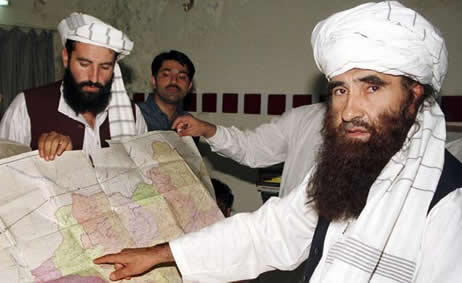That is the question ricocheting off the walls in offices from DC to Islamabad. It pertains to the barbed issue the infamous Haqqani network. Often described as “the Sopranos of Afghanistan,” the Haqqani network is one of the most powerful actors in the region – a brutal crime family established under the father, Jalaluddin Haqqani in the days of the Soviet invasion of Afghanistan. The Haqqani network is now operationally run by his son, Sirajuddin Haqqani, who by all accounts is much more an extreme Islamist than his father ever was.
The reason this thorny issue is now front-and-center of US-Pakistan relations is because significant individuals on the American side are now pressing for Pakistan to take action against the Haqqanis. Ranging from Admiral Mike Mullen, Chairman of the Joint Chiefs of Staff, to Secretary of State Hillary Clinton, to the top American diplomat in Islamabad, Ambassador Cameron Munter, the US has built up a chorus of voices demanding Pakistan tackle the group responsible for scores of attacks within Pakistan, and increasingly in Afghanistan. The final straw seems to have been the recent attack on the American Embassy in Kabul, in which 5 Afghan policemen and 11 civilians (including 6 children) were killed. The bombing had all the hallmarks of the Haqqani network, and thus began the full-on pressure for Pakistan to finally go after them.
The Zardari administration has responded swiftly and strongly to American accusations the ISI is supporting the Haqqani network. In a brief statement, Gen. Ashfaq Parvez Kayani said the charges about his intelligence agency’s ties to the Haqqani militant network were baseless and part of a “blame game in public statements.” Foreign Minister Hina Rabbani Khar, in the United States to attend the United Nations General Assembly, said “Anything which is said about an ally, about a partner publicly to recriminate it, to humiliate it is not acceptable.” Speaking about the sudden rupture in relations, Prime Minister Yousaf Gilani said the United States “cannot live with us and cannot live without us.”
Lost in the middle of the rhetoric is the pause for introspection so badly needed within the halls of power in Pakistan. The US is accusing our ISI of working with the Haqqani network – a group that readily (and proudly!) admits to massacring our citizens and those in our neighboring Afghanistan. We need to ask ourselves a few questions going forward:
1. Is there institutional support for the Haqqani network? Thorough investigations are in order before we issue muscular refutations to the Americans.
2. Why do such depraved groups feel secure in Pakistan? How did our country get to the point where the Haqqani network decided to set up headquarters in the tribal areas of North Waziristan? How did we reach the point where Osama bin Laden settled in Abbottabad? These facts should trouble each Pakistani – we have lost too many of our own to their sick thinking to continue ignoring the fact they live on our soil!
So where do we go from here? US-Pakistan relations are at a critical juncture. The way we handle this going forward may very well set the tone for our partnership with the US for years to come. Our uneasy alliance with the United States can fall neatly into place if we can align our national interests. To do so, we must first acknowledge some bitter truths.
The US is poised to pull out its troops from Afghanistan, and there is no doubt Pakistan will be a key player in the ensuing political development. It is in our best interests to look at the situation from all angles instead of muddling through and pushing back with denial after denial. Only then can we truly realize what Pakistan wants, and what it needs to do.
![]()






